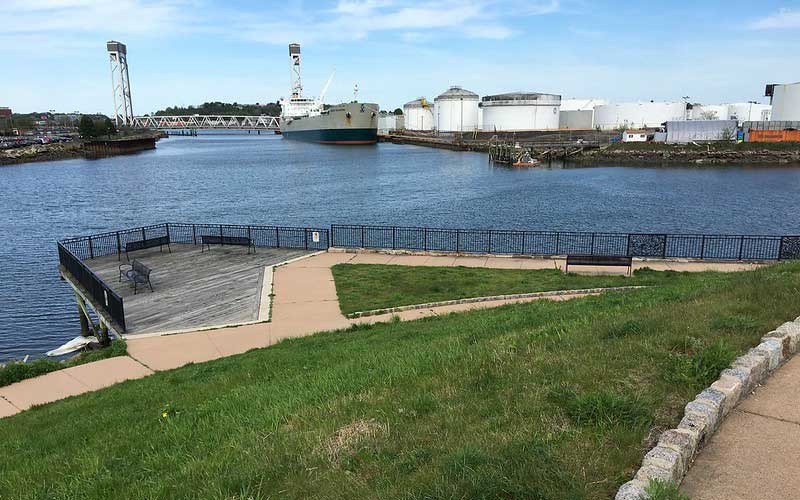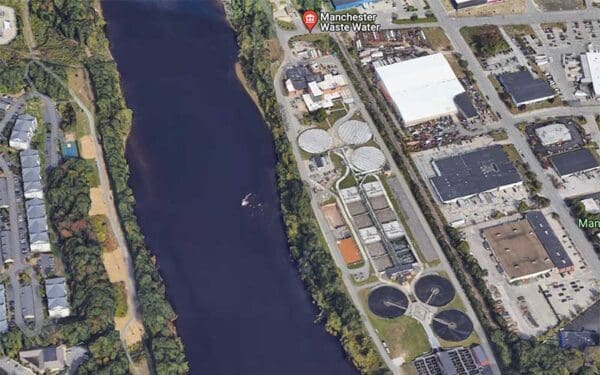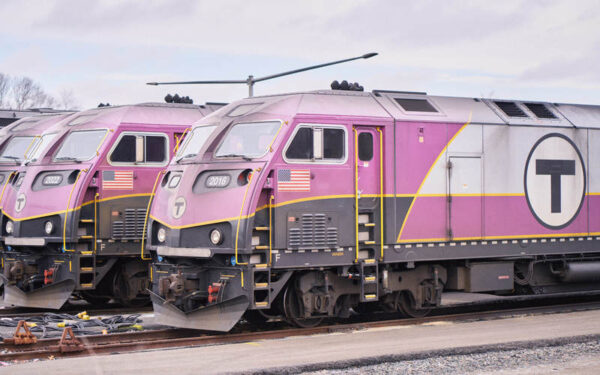
Neighbors of Eagle Hill in East Boston are opposing the construction of a new Eversource electrical substation. But the lack of accessibility for non-English speakers silenced many community members, shutting them out of a process that directly affects their lives and neighborhoods. Photo: Ed Lyons, CC BY-NA 2.0
Since 2016, residents of Eagle Hill in East Boston, Massachusetts, have opposed the construction of a new electrical substation proposed by Eversource. Neighbors worry that the project would have a dire impact on this primarily low-income neighborhood, which is already overburdened by industrial development. The high-voltage electrical substation would sit just feet away from a children’s playground, a small nature reserve, and a creek. Even more concerning is that this area floods during storms and heavy rainfall – hardly an ideal spot for electricity infrastructure.
But in its fight to stop the project, the community found itself facing an unexpected challenge. Nearly half of people who live in East Boston either don’t speak English as their first language or have limited English proficiency. Yet, the state officials of the siting board charged with evaluating the project claimed that requests for language interpretation at public hearings would be disruptive. And, even when interpretation was provided, it was poorly done.
The lack of accessibility for non-English speakers silenced many community members, shutting them out of a process that directly affects their lives and neighborhoods.
It’s also unlawful. We are suing the EPA to make sure injustices like this can’t repeat. The EPA should ensure the siting board – and all federally funded state agencies – provide language access.
Residents Must Have a Say in Their Communities
When we first learned of these injustices, Conservation Law Foundation – along with our partners at GreenRoots and Lawyers for Civil Rights – filed a discrimination complaint against state energy agencies. But federal authorities initially refused to investigate it – essentially allowing for the state’s discrimination to stand.
In response, we sued the EPA to force them to conduct a proper investigation under the Civil Rights Act. EPA and the federal Department of Transportation are now investigating.
Diga No to Eversource (Say No to Eversource)
By law, state agencies that receive federal funding must provide all people – no matter their national origin and the language they speak – an equal opportunity to participate in public processes. The Massachusetts Energy Facilities Siting Board, the entity charged with reviewing and approving large-scale energy projects like the Eversource substation, is no exception.
The EPA must act immediately to fix the problem from the root by ensuring that the Siting Board – and all federally funded state agencies – provide translated documents and language interpretation during future hearings.
Federal Agencies Can’t Exclude Non-English Speakers – and Neither Can the State Agencies They Fund
Although most federal (and state) agencies use English as their business language – the United States has no official language. And no one is required to speak English to be taken into account in their communities.
Anti-discrimination law under Title VI of the Civil Rights Act prohibits discrimination based on national origin. And, it has been long-established that language discrimination falls within this protected category.
In other words, federal and state agencies receiving federal funding cannot discriminate against people who speak a language other than English (by, for example, claiming that interpretation services would disrupt a public hearing on a proposed project). That includes the Massachusetts Executive Office of Energy and Environmental Affairs and any state board that falls under it.
Ultimately, though, creating an inclusive space involves more than simply inviting everyone to join the conversation.
Having a Seat on the Table Is Not Enough
Beyond telling non-English speakers that they can join a public hearing, agencies must provide them accommodations so that they can meaningfully participate in important decision-making processes.
Often, agencies do make an effort to offer translation and interpretation services. But, for these services to be effective, they need to be done right. Interpretation should be made both ways – the words of the state officials at a hearing must be interpreted for the public, and the public’s words must be interpreted back to the state officials. And this must be done accurately and in real-time.
That is the only way to ensure that, beyond understanding the content of a hearing, community members can also feel confident that they can express and have their concerns properly addressed.
Otherwise, community members risk being shut out of critical discussions that will shape the future of their neighborhoods. Especially in communities already overburdened by pollution and industry, we cannot afford for their messages and opinions to get lost.
What’s at Stake Beyond the Lawsuit Against the EPA?
Our lawsuit against the EPA will continue to unfold. But the systems and attitudes excluding environmental justice communities from having a voice are bigger than a single project or state board.
The potential success of our lawsuit would direct the EPA to review our complaint and conclude that the siting board engaged in language discrimination. But just like the EPA, all federal agencies in the U.S. must ensure that any entities benefiting from federal funds conduct their work free of discrimination. So, we aim for these agencies to withhold funding to state agencies if they fail to provide language access.
Environmental justice communities shouldn’t have to deal with additional layers of bureaucracy and legal challenges to have their opinions heard. After all, a solution doesn’t work unless it works and involves everyone in the room – especially those with different voices.




